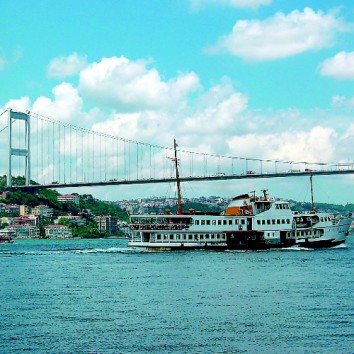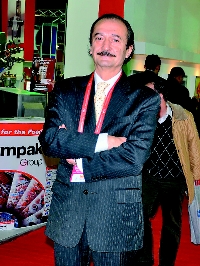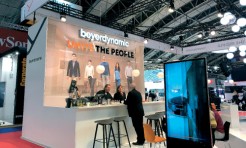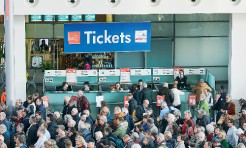UFI in Istanbul: The competition for budgets
International trade fair experts are coming together at the annual
UFI Open Seminar in Europe from 15 to 17 June. They are meeting in Istanbul,
the gateway to Asia.

The circle is now complete,
certainly as far as the host city is concerned. After almost seven years, the
UFI, the global association of the exhibition industry, is returning to
Istanbul for a major event. The UFI’s 75th annual congress was held in the
Turkish capital in the autumn of 2008. The huge firework display over the
Bosphorus organised by host Bekir Cakici still remains in the memory of those
who experienced it. This time around, things will be on a smaller scale. After
all, this is “only” the association’s smaller summer event. Nevertheless, there
should be enough information flying around to rival any firework display. The
delegates will be exchanging experiences and sharing their expertise. Urgent
and fascinating issues will be explored in presentations and discussions. The
focus will be on the competition for budgets between trade fairs and other
marketing instruments. In this connection, the seminar will be concerning
itself with the future role of trade fairs in the marketing mix.
One of the really key issues
currently is the digital revolution. It is being compared to a tsunami
engulfing traditional marketing channels. On the one hand, trade fairs are also
affected by this overwhelming wave. At the same time, however, organisers can
take advantage of this wave of digitization and turn it into an opportunity. It
also helps to see the broader picture when you are seeking to develop and
implement suitable strategies. Analogies will be drawn and findings presented
from other sectors at the UFI seminar in Istanbul. One sector that has already
felt a significant impact from digitisation is publishing. Holger Feist, chief
strategy officer at Messe München, will be pointing out what the trade fair
industry can learn from the digital revolution’s effects on traditional media.
Feist knows what he is talking about here: he used to work for a large
publisher.

How the marketing budget is
distributed always depends to a certain extent on the spirit of the times and
the trends that are postulated. There are plenty of decision-makers who test
the wind and then go with the flow. There will also be a platform discussion in
Istanbul about whether exhibitors are acting differently or doing much the same
as always. And in a workshop with Eva Teruzzi of Fiera Milano, organisers will
be analysing and developing future approaches to marketing. Among other things,
the delegates will be trying to establish what forms of digital marketing make
sense. The new media are generally valuable when used as marketing tools. But
if they are used wrongly, cultural differences can mean they come up against
their limits. The delegates in Istanbul will also be considering the role of
marketing agencies, which often influence the decisions of their clients. For
this reason, their ability to open and/or close doors should never be
underestimated. You will find the full and continually updated programme of the
upcoming UFI Open Seminar in Europe on the UFI website (www.ufi.org).
Access to 1.5 billion customers

Exhibitors taking
part in trade fairs in Istanbul can reach around 20 percent of the world’s
population. “Turkey offers access to 1.5 billion customers in Europe, Eurasia,
the Middle East and North Africa,” explains Wolfgang Pech, senior vice
president at Deutsche Messe in Hanover. “The combined GDP of these markets is
25 billion US dollars,” he calculates. This is where the company stages the
region’s largest industrial fair, Win Automation Eurasia. The last time it was
held, in March, 1,581 exhibitors from 21 countries took part. They presented
their future-oriented smart manufacturing solutions to around 77,000 visitors.
Four separate trade fairs are held under the umbrella of Win Automation
Eurasia, covering industrial automation, materials handling and logistics,
fluid technology, energy and electrical engineering. These sectors make a
decisive contribution to improvements in efficiency and quality. At the same
time, costs can be reduced when appropriate use is made of these technologies.
The region is attractive not just from an economic point of view but
interculturally as well. “Turkey is open to innovations and gives prompt
feedback,” emphasises Turgay Halimler, managing director of Yaskawa Turkey, an exhibitor
of automation solutions. The company’s products are used in manufacturing
facilities all over Eurasia. Companies that are yet to conquer the market will
soon get another opportunity. The next Win Automation Eurasia is only ten
months away. It will be held from 17 to 20 March 2016 at the Tüyap trade fair
centre in Istanbul (www.messe.de).
Author: Peter Borstel
This article was published in TFI issue 3-4/2015
Share in Facebook, Twitter or Google+:
TFI - Trade Fairs International - The International Trade Fair Magazine.
© 2006 - 2024 by TFI-Verlagsgesellschaft mbH. All rights reserved. TFI-Verlagsgesellschaft mbH shall accept no responsibility for the contents of external links and other contents.
TFI-Know-how
-
What to do when things go wrong at virtual or in-person events?

In the event world, it’s simply part of life if things don’t work out as planned.
-
How can networking be made to work at online events?

Networking typically happens at real, in-person events. But it’s also possible to do it online; it just works a little differently. There are various options available to organisers.
-
How can exhibitors stand out at trade fairs?

New products and a well-conceived stand design are not the only drivers for a successful presence. Many other factors are also important, but trade fair planners often lose sight of them.
-
How can industry decision-makers be reached online?

Trade fairs and trade fair companies need to constantly further develop, become more agile and flexible and offer services all year round. New, digital offerings are very important here. With its TrustedTargeting technology, Messe München offers its customers access to leading business-to-business decision-makers on the Internet.


